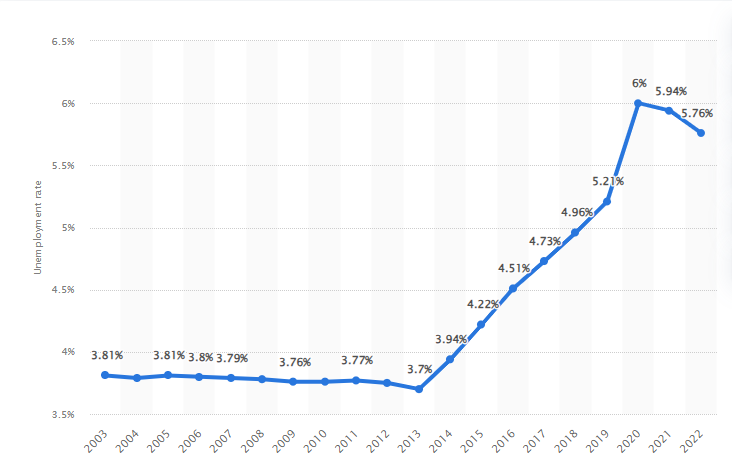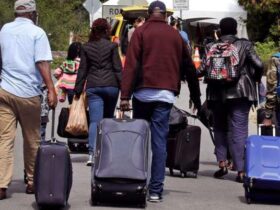By Favour Ibe kalu

Nigeria’s economic crisis has plunged millions of its citizens into poverty. The situation is dire in all regions of the country where insecurity, food scarcity, unemployment and low human capacity development have worsened living conditions.
Nigeria has faced several economic crises throughout its history, often stemming from factors such as corrupt and poor policies, a high inflation rate, high surges in food prices, and unemployment.
One significant economic crisis in recent years is that of 2016, when Nigeria slipped into the worst recession; another is the 2023 and present 2024 crisis.
In these two years, Nigeria inflation rate has created an alarming effect worsening the economic crisis.
Recall that the National Bureau of Statistics (NBS) reported that Nigeria’s inflation rate surged to 29.90 percent in January 2024.
This substantial increase underscores the severity of the economic strain being experienced by citizens across the country.
Also, fluctuations in the foreign exchange market have been persistent, based on data obtained from FMDQ.
According to the data, Naira experienced a decline to N1,537.96 per US dollar on Friday, down from N1,498.25 on Thursday, which has provoked surges in the prices of commodities, especially food commodities.
The combination of these factors has contributed to the escalation of food prices in Nigeria, posing significant challenges for households, especially those with limited incomes and vulnerable populations.
The hike in food prices in Nigeria has become a pressing concern, impacting both households and the overall economy.
In the current market, the price of food products has increased, doubling from its previous price in late 2023 to 2024.
Similarly, according to reports, alcoholic beverages, including canned beer , are now selling at N700, up from N400, while the price of a can of malt drink and pet drinks has surged to N400 from its previous N250.
Amidst the backdrop of soaring food prices, the country has witnessed a surge in protests highlighting the high cost of food. Citizens, frustrated by the relentless escalation in prices of essential food items, have taken to the streets in various parts of the country ( Niger, Plateau, Lagos state and more) to voice their grievances and demand urgent action from the government.
These protests underscore the profound impact of rising food prices on the livelihoods of ordinary Nigerians, many of whom struggle to afford basic necessities amidst stagnant incomes.
Just late last year and early this year, there has been a drastic increasing trend of outward migration in Nigeria.
Based on the information gathered from Statista, outward migration, often dubbed “Japa,” has raised significant concerns, particularly due to the departure of numerous young Nigerian professionals and academics.
This phenomenon, characterized by a substantial exodus of skilled individuals seeking opportunities abroad, has become a focal point of discussions surrounding Nigeria’s brain drain.
The departure of these talented individuals not only poses challenges for the country’s workforce and intellectual capital but also underscores broader issues related to economic opportunities, social mobility, and the retention of talent within Nigeria’s borders.
Statista also noted that Nigeria has experienced a massive outflow of its population in recent times. For instance, during the first quarter of 2023, there was a notable increase in the number of Nigerians relocating to Canada, reaching a substantial figure.
Moreover, findings from a 2021 survey conducted by the African Polling Institute revealed that a staggering 7 out of every 10 Nigerians preferred to leave the country if presented with the opportunity to do so.
In addition, the number of Nigerian students in the United Kingdom experienced a remarkable five-fold increase, reaching a total of 325,000.
To buttress this revelation, official records from the Nigeria Immigration Service (NIS) indicated a record-breaking issuance of 1,899,683 passports in 2022.
These statistics reinforce the scale and scope of the migration phenomenon impacting Nigeria, reflecting both domestic and international trends in population mobility. This is mostly attributed to the issue of unemployment in Nigeria.

A report gathered from Daily Trust captured the migration trend among northern youths who leave the shores of Nigeria in search of better living in the Middle East and North Africa.
According to the report, a Nigerian identified as Hassan Dantsoho just like any other Nigerian youth, plans on relocating to Kuwait, one of the world’s oil-rich countries in the Middle East.
He said, “I have remained unemployed after years of graduation in Nigeria. I am optimistic that by the end of February, I will bid farewell to his family in Kano.”
This affirms projections from Statista early this year, which reports that by the year 2050, Nigeria’s migration rate is expected to reach -0.16 per 1,000 population.
This forecast suggests that during this period, the number of individuals departing from Nigeria will marginally exceed those entering the country.
This is derived from analyzing the migration trends spanning from 2000 to 2021, which reveals a consistent pattern of outbound migration, pointing out a sustained flow of individuals seeking opportunities beyond Nigeria’s borders.
This trend highlights the ongoing challenges facing Nigeria in retaining its population and talent within the country.
Amidst the escalating economic challenges, unemployment, corrupt leaders, trends of migration and increasing prevalence of hunger within the nation, the Nigeria Labour Congress (NLC) has taken a decisive step by declaring a nationwide strike set to take place on February 27 and 28, 2024.
READ MORE: BREAKING: NLC Calls Two-Day Nationwide Protest Over Hardship Under Tinubu’s Govt
This strategic move by the NLC is intended to exert pressure on the federal government, compelling it to take urgent action in addressing the deteriorating economic conditions and providing relief measures to alleviate the plight of struggling citizens.
By mobilizing workers across various sectors and industries, the NLC aims to amplify the voices of the populace and underscore the urgency of implementing effective measures to mitigate the adverse impacts of the economic downturn.
Furthermore, the scheduled nationwide strike represents a collective call to action, signaling the determination of the labor union to advocate for the welfare and rights of Nigerian workers and citizens alike.
It serves as a stark reminder to the government of its responsibility to prioritize the well-being of its people and take concrete steps towards fostering economic stability and prosperity for all.
As preparations for the strike intensify, discussions surrounding its potential ramifications and the government’s response have dominated public discourse.
As we wait for the anticipated national strike and what it might bring, the question remains, what is the way forward for Nigeria?








Leave a Reply